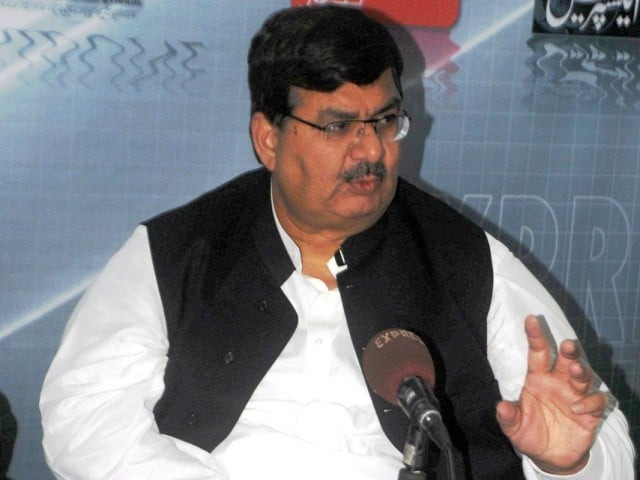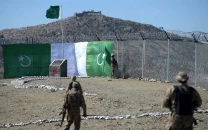Pakistan to face balance of payment crisis in 2016, says AKD
Business tycoon’s assertion comes as country faces declining exports, low FDI

PHOTO: MOHAMMAD SAQIB
Business tycoon Aqeel Karim Dhedhi has said Pakistan will face a balance of payment (BoP) crisis next year.
In an interview with The Express Tribune, the chairman of the AKD Group said the external sector of the economy is likely to come under pressure as soon as 2016 when foreign exchange inflows from the International Monetary Fund (IMF) stop.
Improving balance of payments
The BoP reflects all economic transactions of a country with the rest of the world. A BoP crisis can put the national currency under pressure as soon as a country appears to be defaulting on interest payments due to fiscal constraints. In simple words, money leaves the economy during a BoP crisis and the government finds it difficult to borrow further, thus wrecking the value of the national currency.

“I foresee a BoP crisis because exports are declining and foreign direct investment (FDI) is nowhere to be seen. We should forget about achieving a current account surplus this year,” Dhedhi said.
According to the latest export figures released by the State Bank of Pakistan (SBP), Pakistan’s exports shrank by $538 million, or 9%, on an annual basis during the first quarter of the current fiscal year. Although the year-on-year rise in the FDI for Jul-Sept was $15.6 million, or 7.7%, the increase seems unimpressive in view of the GSP-Plus status that Pakistani exports enjoy in the European market.
January figures: Trade deficit contracts by more than half
Differing view
Dhedhi’s assertion that a current account surplus should not be expected in the current fiscal year is contrary to the forecast of many analysts. SBP data shows the deficit in the current account, which is part of the BoP, has narrowed significantly in Jul-Sept. The current account deficit clocked up at $109 million in the first quarter of 2015-16, down 93.3% from a year ago.
Declining oil prices are going to result in a year-on-year drop of over 23% in Pakistan’s oil import bill in 2015-16, as per the estimate of the IMF. However, Dhedhi says the deficit in the current account is unlikely to change into a surplus by the end of 2015-16 despite a massive drop in international oil prices.
“Even if the current account balance is in surplus (at the end of 2015-16), that will be because of our loans. Such a surplus has no real value,” Dhedhi says.
The Express Tribune explains foreign debt
Finance Minister Ishaq Dar prides himself on building SBP-held foreign exchange reserves from just about $3 billion in November 2013 to almost $15 billion. Critics, however, point out that most of these reserves owe their existence to foreign debt. In addition to total disbursements amounting to $4.5 billion from the IMF since 2013, Pakistan has also raised at least $3.5 billion from the international bond market by floating Sukuks and Eurobonds.
But the inflows of money from the IMF are going to dry up by the middle of next year. More importantly, Pakistan will start making loan repayments to the Paris Club -- following the debt rescheduling of December 2001 – in 2016-17 while IMF repayments will begin from 2017-18. In the absence of meaningful reforms, according to Dhedhi, the result will be another BoP crisis.
“The economy shouldn’t be managed the way it’s being managed,” he says, adding that all-time low benchmark interest rate indicates economic managers feel ‘comfortable’.
Pakistan’s journey from $6b to over $15b
In a developing economy like Pakistan’s, low interest rates should be a reflection of economic growth, surplus reserves, shrinking budget deficit and low inflation, Dhedhi says. So why was there a need to raise money from the global debt market if we’re indeed comfortable economically, asks Dhedhi.
“An international bond is floated amidst the worst conditions when reserves are depleting fast. Those responsible for economic management are either thieves or simply stupid,” he says.
Not bullish on stock market
Saying that the China-Pakistan Economic Corridor (CPEC) is the only ‘trigger’ for the stock market, Dhedhi recommends retail investors should stay cautious going ahead.
Foreign exchange: SBP’s reserves clock in at $15.202b
The benchmark index of the Karachi Stock Exchange (KSE) has remained largely flat during the first four months of 2015-16, and Dhedhi sounds far from bullish on the stock market right now.
While he advises investors to look for value stocks in the food and consumer goods sectors, Dhedhi recommends they should stay away from sectors that are dominated by cartels or have received ‘artificial benefits’ from the government.
“It won’t be wise to be overly bullish on the stock market. Retail investors should invest, but not use borrowed money. It will be dangerous to borrow just because credit is cheap these days,” he says.
The writer is a staff correspondent
Published in The Express Tribune, November 2nd, 2015.
Like Business on Facebook, follow @TribuneBiz on Twitter to stay informed and join in the conversation.



















COMMENTS
Comments are moderated and generally will be posted if they are on-topic and not abusive.
For more information, please see our Comments FAQ